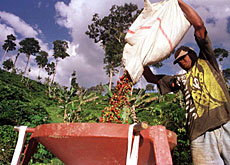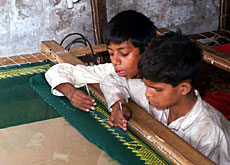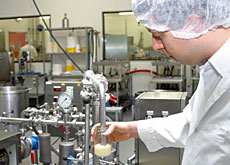Coffee industry agrees code of conduct

Swiss-based food giant Nestlé and three other major coffee companies have agreed a code of conduct with producers in a bid to improve standards across the industry.
The agreement aims to create better working conditions and protect the environment in coffee-producing countries.
The Common Code for the Coffee Community (CCCC) was presented by representatives of the industry and the German government in the city of Hamburg on Friday.
However, it is not clear when the voluntary pact will be signed.
Alongside Nestlé, the United States companies, Kraft Foods and Sara Lee, as well as Tchibo from Germany are taking part in the initiative.
Signatories will have to pay minimum salaries, stop using child labour, allow trade union membership and stick to international environmental standards on pesticide and water pollution.
The agreement follows similar codes adopted by the clothing, sports goods and diamond industries.
It comes in response to complaints by consumer and environmental groups that the companies exploit low prices and poor working conditions in a world market glutted with excess coffee.
Nestlé
Swiss multinational Nestlé has welcomed the coffee code, which was worked out over 18 months with the German coffee industry association.
“The code is an excellent idea. It is in our own interest because it helps to guarantee supplies and quality standards,” Nestlé spokesman François-Xavier Perroud told swissinfo.
Perroud added that the code, once adopted, would not trigger higher coffee prices.
“Coffee consumption remains stable in industrialised countries. It can only increase in developing countries, and consumers there could not afford to pay too much.”
The code will also apply to coffee producers from Brazil, Colombia, Africa, Asia and Central America as well as several non-governmental organisations.
Greenpeace
However, the environmental group, Greenpeace, has withdrawn from the initiative amid disagreement over the use of genetically modified crops.
“We regret that the coffee industry, including Nestlé, was not ready to exclude the use of gene technology in favour of sustainable and ecological coffee production,” said Andreas Bernstorff of Greenpeace.
The group nonetheless acknowledges that the code contains positive elements.
“But it doesn’t go far enough on essential principles,” added Bernstorff.
Ian Bretnam, deputy director of the Fairtrade Foundation, said anything that improved workers’ conditions had to be welcomed.
“But it [the code] seems to be largely focused on plantation workers and doesn’t address the fundamental problem of the slump in prices,” he added.
swissinfo
Coffee producers and four of the world’s largest coffee companies, including Nestlé, have agreed a code of conduct for the industry.
Signatories will have to pay minimum wages, stop the use of child labour and harmful pesticides.
The voluntary code follows similar pacts by global clothing, sports goods and diamond industries.
Around 25 million people in 70 developing countries depend on coffee production.
The coffee retail market is worth about $35 billion (SFr44.9 billion) a year.
Brazil is the world’s biggest coffee producer, with a market share of 30%, ahead of Vietnam.

In compliance with the JTI standards
More: SWI swissinfo.ch certified by the Journalism Trust Initiative




You can find an overview of ongoing debates with our journalists here . Please join us!
If you want to start a conversation about a topic raised in this article or want to report factual errors, email us at english@swissinfo.ch.